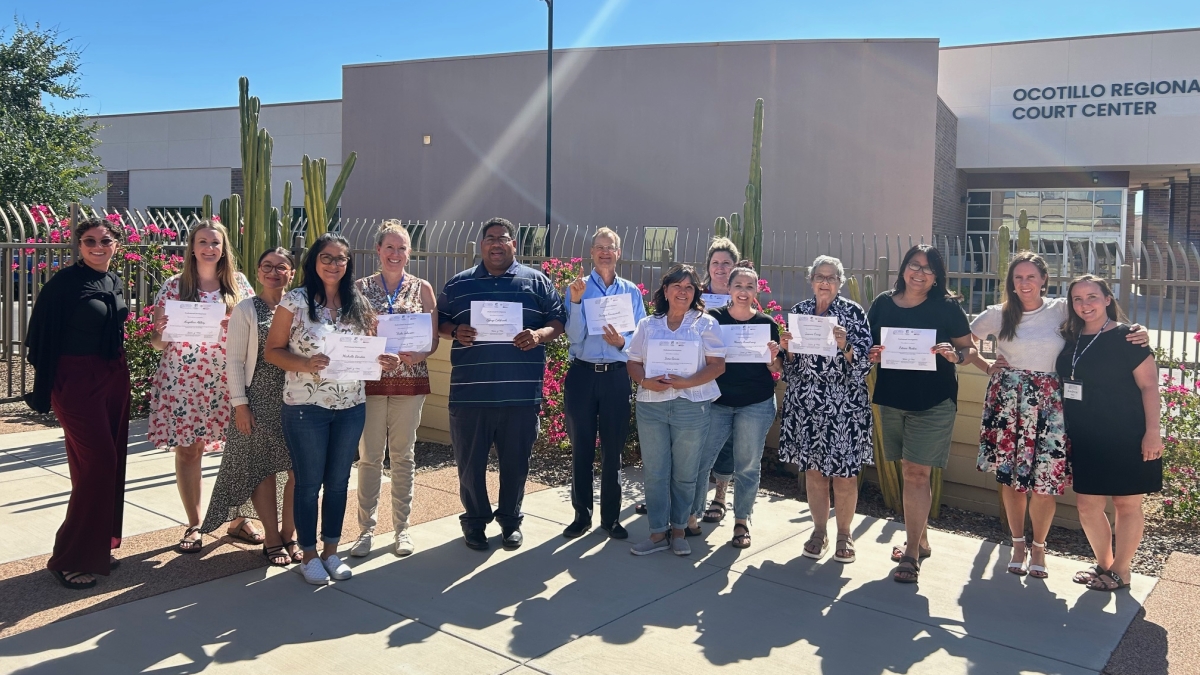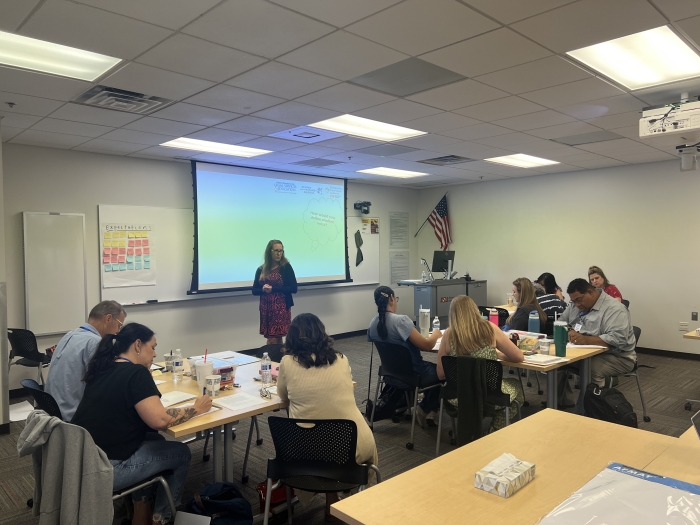ASU teams up to help K–12 teachers empower students

Participants show off their certificates after completing the Student Voice Institute workshop. Courtesy photo
By Georgann Yara
Along with her peers, Angelica Abbey leaned over the square table and affixed colored sticky notes throughout the vibrantly illustrated children’s book “Sofia Valez, Future Prez,” the story of a second grader and budding activist who, despite adults seeing her as a kid, sparks positive change in her community.
The goal was to examine key aspects that enabled the heroine Sofia to accomplish her goal, and then share their impressions with the rest of the class.
The book is geared toward elementary school readers. However, on a Tuesday morning at Arizona State University’s Chandler Innovation Center, all eyes focused intently on the pages belonged to grown-ups.
The exercise was part of the Student Voice Institute, which aims to equip K–12 Arizona educators with the knowledge and resources to implement School Participatory Budgeting and Project Citizen, two civic learning programs that focus on student voice driving budget and policy decision-making processes.
ASU’s Participatory Governance Initiative; the Arizona Bar Foundation, which spearheads Project Citizen; and the Center for the Future of Arizona, which is responsible for School Participatory Budgeting, collaborated on the workshop held this summer. Attendees were fourth through 12th grade teachers, mostly from Maricopa County schools.
Abbey was among 10 teachers poring through the story. The goal with this, and the exercises they would complete during the three-day event, was to identify themes and methods to develop programming that empowers students to be good citizens and use their voice to create a positive school environment, with the understanding of a budget’s role in the process.
A sixth grade teacher at Frye Elementary School in the Chandler Unified School District, Abbey has always been interested in school participatory budgeting but never knew how to implement it. That's why she was taking part in this event.
“I think that school participatory budgeting is so important because it’s giving students that voice as to where the funds can be allocated, to really help them and bring those initiatives that the kids want,” says Abbey, who is the sponsor of her school student council. “They have a whole different perspective than teachers so it’s important to have them at the table. I just know it would really benefit not only our school but our students to have that voice.”
While Abbey was drawn to the School Participatory Budgeting component, Project Citizen was what appealed to U.S. history teacher Leticia Mattei.
“I’m always looking for new things to implement in the classroom, to bring in extra projects or enrichment activities, so I thought Project Citizen would be a great way to do it,” says Mattei, who teaches juniors at Verrado High School in the Agua Fria Union High School District in the southwest Valley. “Our high school doesn’t offer anything above and beyond coursework other than AP classes, so I’m looking for something to take ownership of and give students the opportunity to practice citizenship.”
Although it had just been the first day, Mattei was extremely impressed with the program so far.
“It's very organized, it’s engaging and everyone is participating,” Mattei says. “I’m pretty happy.”
In this setting, the use of a children’s book offers a refreshing perspective of how powerful student voices can be. Educators can use it as a springboard for kids to share experiences, find their own voices and reciprocate ideas, explains Tara Bartlett, senior research analyst with the Participatory Governance Initiative at ASU.
“It shows them how to enact change through either budget or policy, and students can give their voice in those processes,” Bartlett says. “Why not have a voice in those decisions when they are the ones going to be impacted by them?”
This is the first time the three entities have collaborated on the project. The concept was inspired by the Arizona Bar Foundation and the Center for the Future of Arizona’s mutual focus on harnessing the strength of student voice.
“Both programs position students as changemakers by using budgets or policy to solve school community problems,” says KaRa Lyn Thrasher, project manager of Civic Health and lead staff on School Participatory Budgeting for the Center for the Future of Arizona. “We’re excited to be able to partner with the bar and ASU, and to provide that direct professional development to educators.”
As part of the workshop, teachers receive guidance on how to implement what they’ve learned, and there’s follow-up to make sure their plans are sticking.
“Especially after the pandemic, getting students engaged so they feel like they are being heard is the driver,” Bartlett says. “We want students to not only thrive academically but also feel like they belong socially and have a school they want to be at.”
More Arts, humanities and education

Professor's acoustic research repurposed into relaxing listening sessions for all
Garth Paine, an expert in acoustic ecology, has spent years traveling the world to collect specialized audio recordings.He’s been to Costa Rica and to Ecuador as part of his research into innovative…

Filmmaker Spike Lee’s storytelling skills captivate audience at ASU event
Legendary filmmaker Spike Lee was this year’s distinguished speaker for the Delivering Democracy 2025 dialogue — a free event organized by Arizona State University’s Center for the Study of…

Grammy-winning producer Timbaland to headline ASU music industry conference
The Arizona State University Popular Music program’s Music Industry Career Conference is set to provide students with exposure to exciting career opportunities, music professionals and industry…


